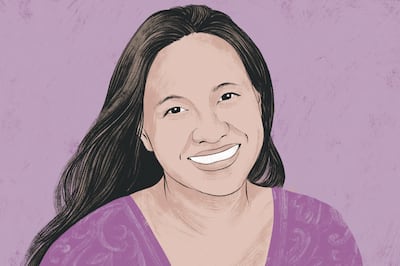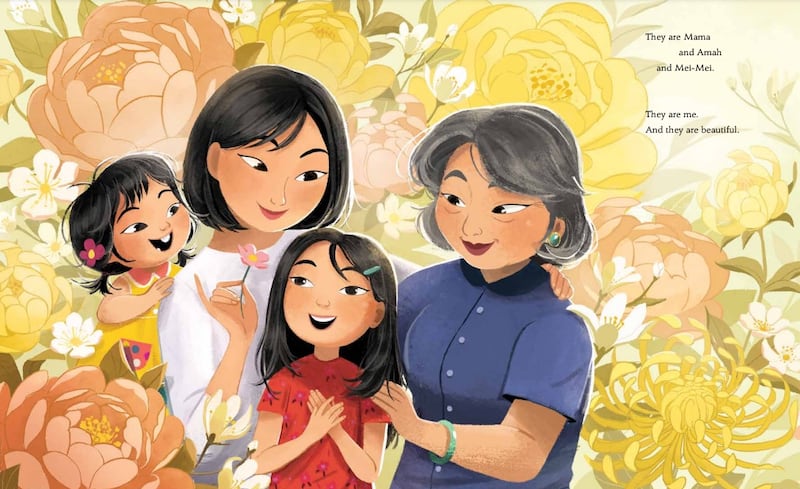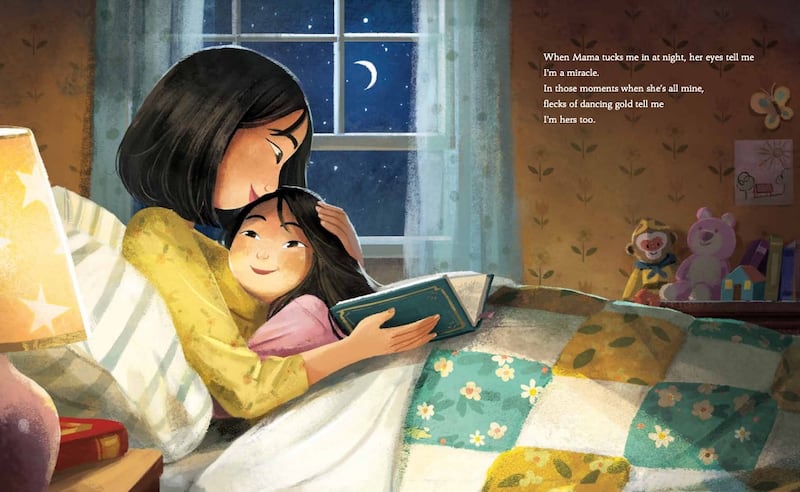Growing up Asian American, Joanna Ho felt surrounded by Disney princesses with big blue eyes and long eyelashes. In the privacy of her room, she stood before the mirror, using her fingers to lift her eyelids in hopes of transforming her body — herself — into something different.
It wasn’t until she was in her 30s that she began to embrace the fact that she had “eyes that kiss in the corners,” to borrow a phrase from and the title of her recently published book. Ho was in Taiwan, where her mom’s side is from, standing in line at a 7-Eleven when she noticed that the people on the cover of the magazine didn’t look like Disney princesses. They were Asian, like her. And they were beautiful. “That means I can be beautiful, too,” Ho recalls thinking.

Later, when Ho became a mother, she knew she didn’t want her children to struggle with their appearance as she did. “I want them to be proud of where they’re from and who they’re from,” Ho says. So she wrote “Eyes That Kiss in the Corners,” which traces a young Asian American girl’s eyes back to those of her beloved grandmother and the heritage they contain; her first book, which was picked up by an imprint of the legendary publishing house HarperCollins, went on to become a New York Times bestseller. A companion book that follows a young Asian American boy and his family, “Eyes That Speak to the Stars,” is forthcoming.
Though Ho has laid the Disney princesses to rest, amid the pandemic, she has found herself struggling with another unattainable ideal: The Woman Who Has It All — the working mom who manages to devote herself equally to her career and her children, capping off a productive day at the office by setting a hot, healthy meal down on the dinner table.
“I’m just barely keeping my head above water,” Ho tells the Deseret News. “I’m a single mom. I work full time. I’m a vice principal at a high school. The writing is a side hustle — it’s the thing I do on the weekends, in the mornings, at night. I have two kids. I can’t do it all. This pandemic, this life, has really forced me to acknowledge that I have limits and that’s OK and that it’s necessary to lean on others to help you through.”
Not only does Ho realize that it’s OK to rely on her community, she’s teaching herself not to actively resist when others offer to help. “I’m always like, ‘You don’t need to do that. I’m fine, I’m fine.’ I’m trying to learn how to — instead of pushing back and saying, ‘I don’t need help’ — I’m learning how to say ‘thank you’ and express my gratitude,” she says.

Ho adds that, too often, our culture promotes women’s self-care as a first step to taking care of others — it’s that trope that every woman has heard: You have to put on your oxygen mask first. But Ho is questioning that idea, as well.
One way Ho takes care of herself is by nourishing her spirit. A member of The Church of Jesus Christ of Latter-day Saints, she remarks, “I don’t know how people get through these times without faith or the gospel to hold on to.” She says she has “an anchor and foundation in the gospel” and takes great comfort in the knowledge that “I can get on my knees and pray and get answers and be guided and make sense of things that are happening in the world.”
“I feel the hand of God in my life,” she adds. “Particularly when things are hard, I find the scripture studies — the things that I read — are direct answers to the things I need that day.”
On a recent night at her home in California’s Bay Area — after her 6-year-old son and 4-year-old daughter were tucked into bed — Ho had an epiphany as she knelt, alone, in prayer. “I was just so overwhelmed by all that was happening in the world and I had this super clear vision that I needed to take care of myself,” she says.
The message, she adds, was breathtakingly simple: “You need to take care of yourself because you matter. Not because you can serve other people. You’re a daughter of God and you matter. Period.”
This story appears in the May issue of Deseret Magazine. Learn more about how to subscribe.


